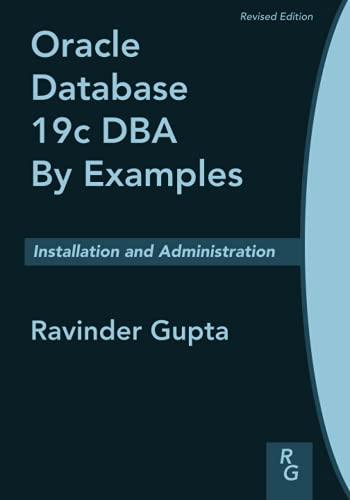Question
Vyasa has to complete a programming assignment overnight. He has to write n lines of code before morning. He is tired and he tries drinking
Vyasa has to complete a programming assignment overnight. He has to write n lines of code before morning. He is tired and he tries drinking some black coffee to keep him awake. But each time he drinks a cup of coffee he stays awake for a short amount of time but his productivity goes down by a constant factor k
This is how he plans to write the program. He will write the first v lines of code, then drink his first cup of coffee. Since his productivity has gone down by a factor of k he will write v // k lines of code. He will have another cup of coffee and then write v // k**2 lines of code. He will have another cup of coffee and write v // k**3 lines of code and so on. He will collapse and fall asleep when v // k ** p becomes 0.
Now Vyasa does want to complete his assignment and maximize on his sleep. So he wants to figure out the minimum allowable value of v for a given productivity factor that will allow him to write at least n lines of code before he falls asleep.
Input: You will read your input from standard input as given in the following format work.in:
2 300 2 59 9
The first line is T the number of test cases. This will be followed by T lines of input. Each line of input will have two numbers n and k. n is the number of lines of code to write and k is the productivity factor, where 1 n 106 and 2 k 10.
Output: For each test case write your result to standard out as shown in work.out. In your output there will be v lines of code the Vyasa has to write, as well as the time it took for each function. For the above two test cases, the output will be:
Binary Search: 152 Time: 9.512901306152344e-05 Linear Search: 152 Time: 0.0005910396575927734 Binary Search: 54 Time: 4.696846008300781e-05 Linear Search: 54 Time: 9.012222290039062e-05
You will be solving this problem in 2 ways. First, you will write a function that uses a linear search to solve the problem. Then you will write a function that uses a modified binary search algorithm to solve it again. Both functions will return the same answer, but the binary search method will usually be faster.
It is recommended that you write a helper function, which given a value v representing the number of lines Vyasa writes before his first cup of coffee and a value k, the productivity factor, will calculate the number of lines Vyasa will write before falling asleep. This can be called in both the linear and binary functions to make the computations easier.
Here is the template of the file Work.py that you will be submitting. You will follow the standard coding conventions in Python
import sys import time # Input: v an integer representing the minimum lines of code and # k an integer representing the productivity factor # Output: computes the sum of the series (v + v // k + v // k**2 + ...) # returns the sum of the series def sum_series (v, k): # Input: n an integer representing the total number of lines of code # k an integer representing the productivity factor # Output: returns v the minimum lines of code to write using linear search def linear_search (n, k): return # Input: n an integer representing the total number of lines of code # k an integer representing the productivity factor # Output: returns v the minimum lines of code to write using binary search def binary_search (n, k): return # Input: no input # Output: a string denoting all test cases have passed def test_cases(): # write your own test cases return "all test cases passed" def main(): # read number of cases line = sys.stdin.readline() line = line.strip() num_cases = int (line) for i in range (num_cases): line = sys.stdin.readline() line = line.strip() inp = line.split() n = int(inp[0]) k = int(inp[1]) start = time.time() print("Binary Search: " + str(binary_search(n, k))) finish = time.time() print("Time: " + str(finish - start)) print() start = time.time() print("Linear Search: " + str(linear_search(n, k))) finish = time.time() print("Time: " + str(finish - start)) print() print() if __name__ == "__main__": main() Step by Step Solution
There are 3 Steps involved in it
Step: 1

Get Instant Access to Expert-Tailored Solutions
See step-by-step solutions with expert insights and AI powered tools for academic success
Step: 2

Step: 3

Ace Your Homework with AI
Get the answers you need in no time with our AI-driven, step-by-step assistance
Get Started


